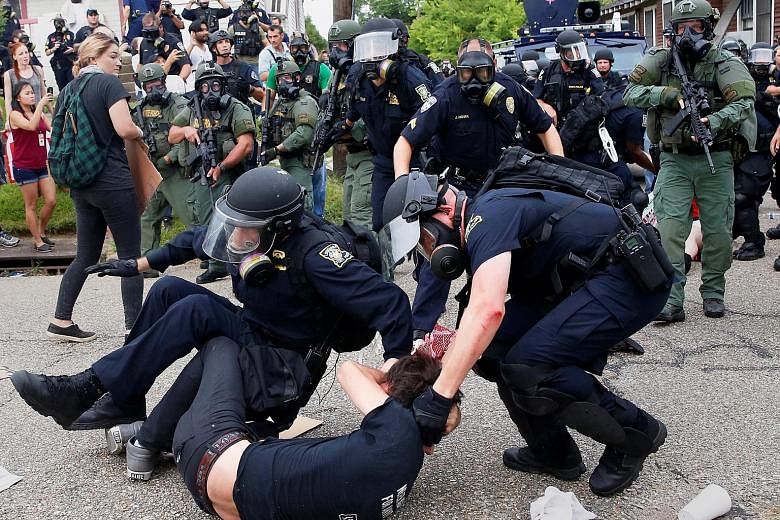CHICAGO • Police departments across the United States are searching for new tactics for a more difficult era of racial tension, increasingly lethal mass shootings and global terrorism.
After last Thursday's killing of five officers in Dallas, the deadliest assault on US law enforcement since the Sept 11, 2001 attacks, nearly half of America's 30 biggest cities have ordered officers to pair up on calls to boost safety.
But that change could strain already thinly staffed police ranks.
In Albuquerque, New Mexico, pairing officers could mean "possibly longer response times for lower priority calls", said a spokesman.
And for cities with tight budgets, some question if this expensive strategy can be sustained for long.
One city - Indianapolis - said it would consider the use of robots to deliver lethal force, an unprecedented tactic until last Thursday, when Dallas police used a robot to deliver and detonate explosives where the shooter was holed up.
While a wave of anti-police protests since the 2014 killing of an unarmed black teen in Ferguson, Missouri, has revived memories of 1960s protests over civil rights and the Vietnam War, Thursday's incident marked something different: a willingness to take up arms against the police.
Ambushes against the police on Thursday and Friday in Tennessee, Georgia and Missouri added to a sense of siege and vulnerability, just as many departments were grappling with greater community suspicion over the use of deadly force.
Denver's police union wants officers in riot gear for protests and armed with AR-15 assault rifles when patrolling Denver International Airport.
Mr Thomas Manger, president of the Major Cities Chiefs Association (MCCA), predicted that police will increase surveillance and expand their security presence at major events. Mr Manger said: "This will cause complaints about violating people's constitutional rights to free assembly, but it is the only way to guarantee safety."
If every police department had New York City's resources, the challenges could be much less. Spokesman Stephen Davis said officers are on duty around the clock and can respond to an active shooter situation in three to five minutes.
"As most active shooter situations last under 10 minutes, that speed is crucial," Mr Davis said.
Mr Chuck Wexler, executive director of the Police Executive Research Forum, a policy group, said 90 per cent of America's 18,000 police forces have under 50 officers, so many cannot afford the staff needed to respond as quickly.
Tense protests and scores of arrests roiled in St Paul, Minnesota, and Baton Rouge, Louisiana, on Saturday night or early Sunday over the police shootings of young black men in those cities last week.
Even after the Louisiana governor and the Baton Rouge police chief gave stern warnings about violence and defended police tactics, the protests and arrests began again on Sunday night.
Meanwhile, the pews and pulpits of Dallas were full of people seeking hope on Sunday.
At Friendship West Baptist Church, Reverend Freddy Haynes called for action and change: "I'm tired of having a service the week after a tragedy. We have done this too much," he said to rising applause from his mainly black congregation.
President Barack Obama, who cut short an overseas trip, planned to travel to Dallas today, where he, along with former President George W. Bush, will address a memorial service.
At least three foreign governments - Bahamas, United Arab Emirates and Bahrain - have issued warnings to their citizens, since the shootings, to take care in US cities where tensions are high, and to avoid protests.
REUTERS, NEW YORK TIMES, WASHINGTON POST

